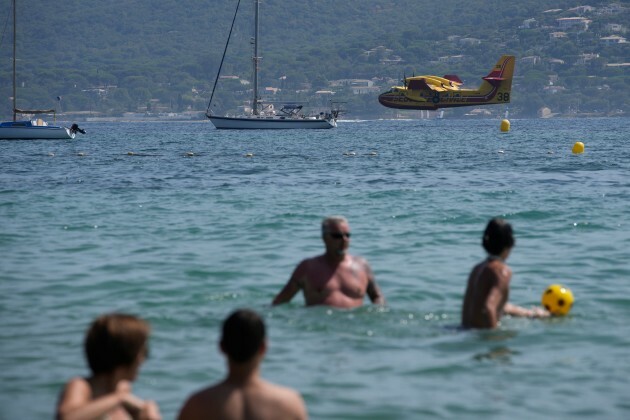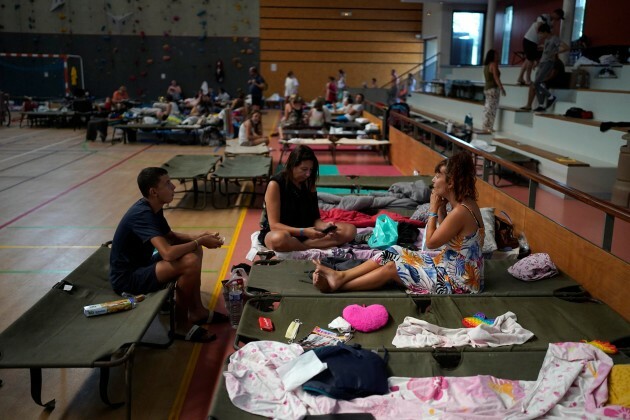Wildfires near the French Riviera have killed two people and have spiraled out of control in the area’s popular forests, fueled by winds and drought.
More than 1,100 firefighters were battling the blazes and thousands of tourists and local residents were evacuated to safer areas.
The fire started on Monday evening, 24 miles from the seaside resort of Saint-Tropez.
Local officials said the fires, sparked by strong monsoon winds from the Mediterranean, had burned 7,000 hectares of forest by Wednesday morning.
Farr District Governor Evins Richard told reporters that two people were killed.
The local prosecutor said the bodies were found in a burning house near the town of Grimaud.
An official investigation has been opened to identify the victims. One of the victims was identified by the French newspaper Far Matin as a man.
The Var district prefecture said at least 27 people, including five firefighters, had smoke inhalation or minor injuries from the blaze.
A burning forest appears from a car window near Le Loc, southern France.
Source: Daniel Cole / AP
Authorities closed a road north of the fire area on Wednesday afternoon due to thick smoke.
Bushfires have forced more than 7,000 people to flee their homes, camps and hotels, forcing them to sleep in makeshift shelters, according to the county.
Among them were more than 1,000 people who set up around a gym in the seaside resort of Bourme-les-Mimosas, where authorities provided food and water.
Vasili Bartoletti and his family, who are from northeastern France, were evacuated early Tuesday from a camp where they were vacationing.
“Around midnight, someone knocked on our door and told us to take our belongings and leave.
“At the end of the alley, we could see red flames. So we hurriedly left.
Bartoletti said his six-year-old son was «very concerned» about the fire.
“I showed him the map.
«I explained to him that we were far away, and that we were taken to a place of safety» at Borm-les-Mimosa, he said.
Holiday-makers enjoy bathing in the Mediterranean while a flooded plane fills their tanks with water to fight wildfires, in the Bay of Sainte-Maxime, southern France.
Source: Daniel Cole / AP
Last month, while the family was on vacation on the Italian island of Sardinia, a large fire there for three days threatened the town where they rented a house.
They did not have to evacuate, but they endured smoke in the air and saw waterlogged planes and helicopters circling back and forth frequently.
French President Emmanuel Macron, who was on vacation at a nearby seaside castle, visited the area of the fire and praised the firefighters for their work.
No news is bad news
magazine support
is yours contributions You’ll help us keep delivering the stories that matter to you
Support us now
French officials have warned that the fire risk will remain very high until Wednesday due to the hot, dry weather.
Temperatures have reached 40 degrees Celsius (104 degrees Fahrenheit) in recent days.
Evacuated campers rest in a gymnasium in Bormes-les-Mimosas, southern France.
Source: Daniel Cole / AP
Wildfires have ravaged the Mediterranean in recent weeks, leaving regions in Greece, Turkey, Italy, Algeria and Spain in smoldering ruins.
In Greece, on Wednesday, a large forest fire northwest of Athens, the capital, destroyed large areas of pine forests for the third day in a row.
In neighboring Albania, hundreds of hectares (thousands of acres) have burned over the past month.
Police said on Wednesday that a former deputy minister had been arrested on arson charges.
In Spain, authorities in the central Castilla y Leon region said firefighters have set up a perimeter around a fire that has consumed at least 12,000 hectares this week.
A fire was also brought under control in the Canary Islands after 300 hectares of farmland were cut.
While the Mediterranean is known for its hot, sunny summers, scientists have little doubt that climate change from burning coal, oil, and natural gas is driving extreme events such as heat waves, droughts, and wildfires.
They say such hardships are likely to occur more frequently as global warming continues.

«Lector profesional. Jugador galardonado. Aficionado a los zombis. Adicto a las redes sociales. Experto en tocino. Erudito en Internet»

